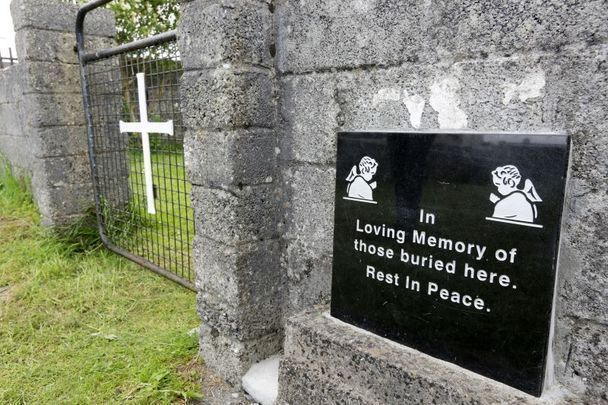A woman who was born in London but raised in a mother and baby home in Westmeath has spoken out about her forced repatriation, stating that she "should have never been in Ireland".
Maria Cahill was born in London as a British citizen in 1954 but was just six weeks old when she was moved to a mother and baby home in Castlepollard, County Westmeath.
Her mother Philomena was referred to an organization known as the Westminster Social Welfare Committee two months before giving birth to her. The organization was guided by the Crusade of Rescue, which had adopted a "crusade" of sending unmarried pregnant women back to Ireland.
Philomena, who was 19 at the time, and her six-week-old baby Maria arrived at the Castlepollard mother and baby home shortly after Maria's christening in April 1954.
Maria told the BBC that she has since discovered that staff at the home took her mother's name away from her, with ledger records stating that her "house name" was Cyril.
"They took my mother's name away because she was a 'bad girl' - and called her Cyril," Maria told the BBC.
The BBC reports that Philomena spent two years at the institution - a standard term of "moral rehabilitation" for a "first offender". She last saw her daughter in 1956 when Maria was given up for adoption.
Maria said she "grew up so lonely" because her adopted mother was emotionally abusive.
She added that she only learned of her birth mother's identity after Philomena's death, stating that she also learned that she had half-siblings and that Philomena had looked for her.
However, Philomena had been erroneously led to believe that Maria was being raised in Canada.
"I was a much-loved and wanted child," Maria told the BBC, adding that she felt "cheated" of her birth mother.
Maria, now 69, has learned that her mother moved to England to work in a cigarette factory, meeting Maria's father shortly after arriving in the UK.
In 2021, the Mother and Baby Home Commission revealed that the Irish Government paid for 2,434 pregnant women to be repatriated to Ireland after traveling to the UK.
The Commission's report stated that many unmarried pregnant women traveled to Britain as an "obvious destination" for anonymity and to have their babies in secret.
However, British charities began to exert pressure on the Irish Government and the Catholic Church in Ireland to limit the number of pregnant women traveling to Britain.
"The number of pregnant unmarried Irish women who came into contact with British welfare services — both voluntary and public — was so great that they were commonly known by the initials, PFIs — Pregnant from Ireland," the Commission's report stated.
The Irish Government subsequently agreed to pay half the costs of repatriating first-time mothers who became pregnant in Ireland.
Campaigners have claimed that the repatriation scheme, which was ostensibly voluntary, was often forced upon pregnant women.
"The women were often forced under duress and "considerable pressure" to return to Ireland," the Commission's report stated.
The Commission's report additionally stated that Irish women who became pregnant in the UK were often repatriated to Ireland, even though the agreement specifically stated that only women who became pregnant in Ireland should be repatriated.
Dr. Lorraine Grimes, a postdoctoral researcher in the Social Science Institute at Maynooth University, told the BBC that the true figure of the repatriations to Ireland is likely far higher than the figure contained in the Commission's report.
Dr. Grimes stated that some repatriations didn't feature in official records at all.
"There were informal, underground arrangements - through priests, through parents - that didn't feature in any official records," Dr. Grimes told the BBC.
There is also a lack of verifiable figures before the 23-year period noted in the Commission's report between 1948 and 1971.
Government records indicate that there were 196 repatriations between 1938 and 1948, while there are no verifiable figures in the 1920s and 1930s.
Meanwhile, Maria's daughter Fiona has demanded an official apology for the "anti-Irish, anti-single mothers" scheme.
"There'll never be a full sense of closure for my mum because she never had the reunion with her mother," Fiona told the BBC.
"But just to have the truth put out there and be told 'sorry' would mean so much."
Maria urged other mother and baby home survivors to "keep strong" and fight for answers.
"There's always a paper trail," she said.
"It might have taken me 40 years but eventually the bits and pieces about my life are coming together."




Comments